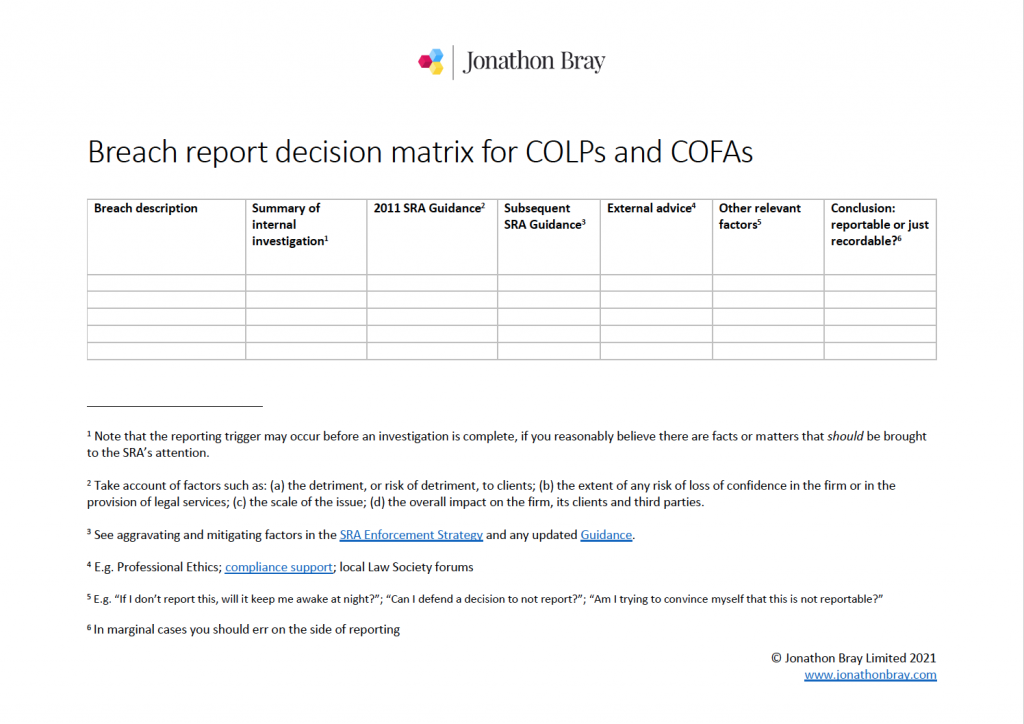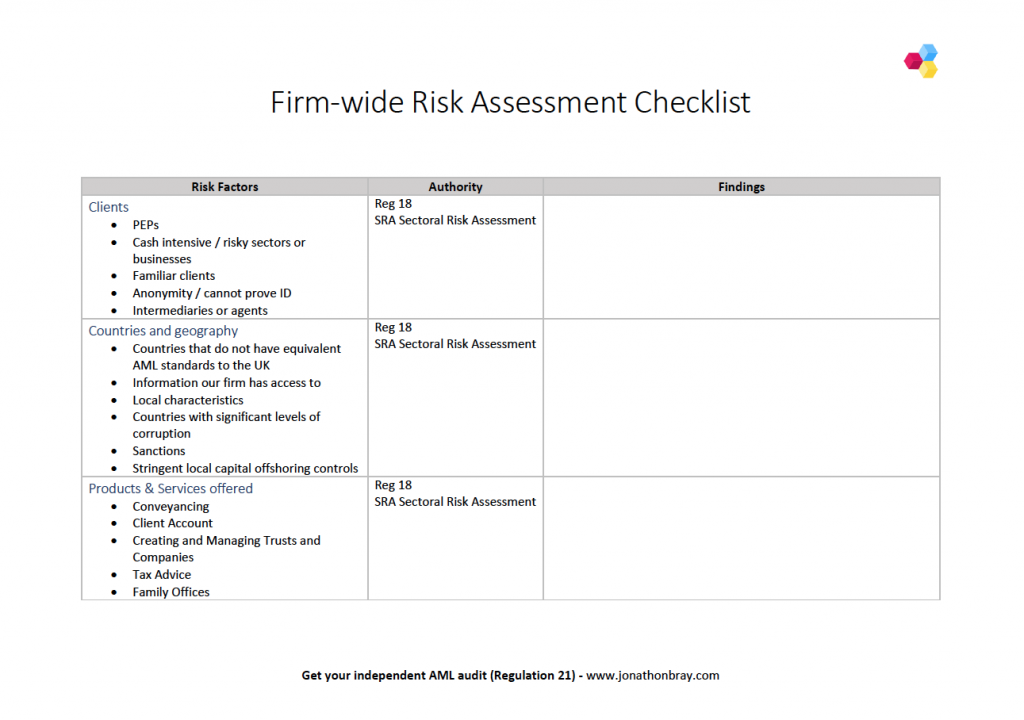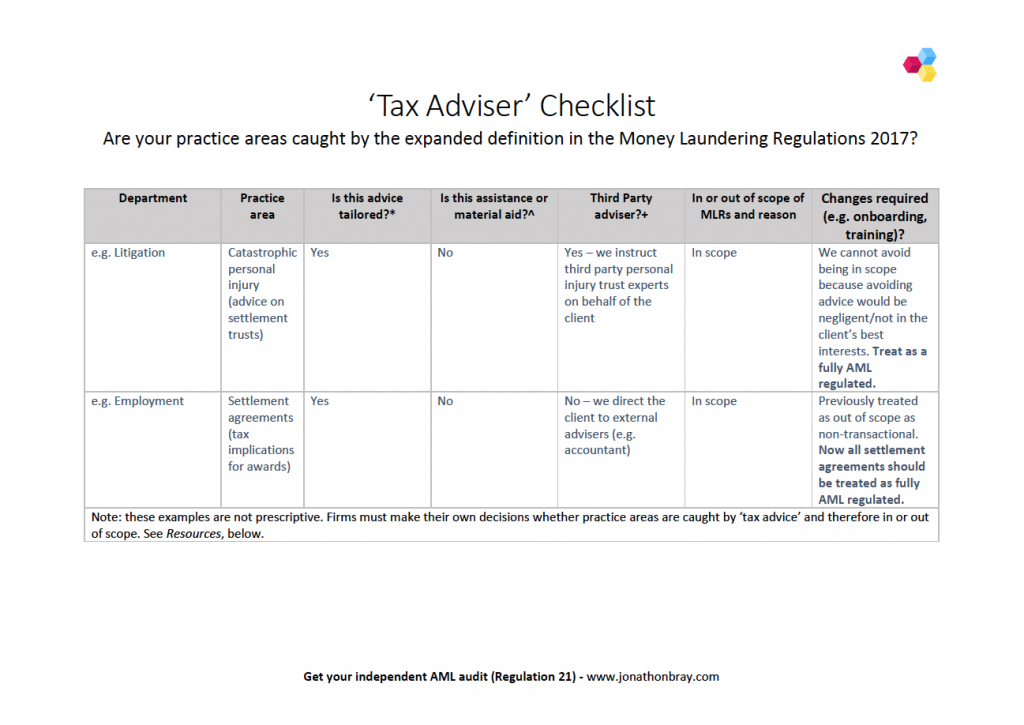When Is A Breach Of The SRA Rules “Serious” And Reportable?
Every firm will have a minor SRA breach every now and then, be it correspondence sent to the wrong address, payments allocated to the wrong accounts, or failing to notify clients of the name and status of supervisor in a client care letter.
Some of these breaches will be trivial, others immediately rectified. Breaches that are not serious can remain in-house. Although no longer a strict requirement, the COLP should keep a record of these minor compliance failures.
The reporting trigger
However, if a breach of the SRA Standards and Regulations, either taken on its own or as part of a pattern, is “serious”, then it must be reported to the SRA “promptly”.
Ultimately, the decision whether to report is a matter of professional judgement.
This doesn’t come without its issues. There is a natural temptation to avoid the regulator (and the wrath of business partners), and therefore err on the side of “not reportable”. This tends to result in only the very serious issues being reported, whilst everything else is rationalised away as being not serious.
That could be a costly mistake. The SRA will come down much harder on firms and individuals if they feel that information has been withheld. In fact, the SRA says solicitors should err on the side of reporting.
That’s why we produced this template decision matrix:
What should be in your AML Firm-wide Risk Assessment?

Every law firm caught by the Money Laundering Regulations must have a firm-wide risk assessment
Regulation 18 of the Money Laundering Regulations 2017 requires all law firms (subject to the Regulations) to have in place an AML firm-wide risk assessment.
The draft LSAG AML Guidance for the legal sector 2021 describes this high level risk assessment as the ‘cornerstone’ of anti-money laundering compliance. Not only does it demonstrate that you have been through the required analysis, but it informs all of your firm’s policies, procedures and controls.
And since it needs senior management sign-off, it is an essential part of establishing an AML culture.
The SRA puts a huge emphasis on the importance of the firm-wide risk assessment. It is the first document they will want to see when they spot check your firm.
SRA ‘Tax Adviser’ Checklist – Use This To See If Your Law Firm’s Practice Areas Are Caught
Sticking with the AML theme, we have been asked to put together a checklist for assessing whether your firm might be impacted by the expanded definition of ‘tax adviser’. (See our post When is tax advice not tax advice? The implications for solicitors are no joke for more information.)
If you’re counting, that’s three template checklists in one day.
An appeal from the Access To Justice Foundation
The Access to Justice Foundation was set up by the legal profession to improve access to justice for the most vulnerable people in society who need legal advice and support but cannot afford it.
Free legal advice services across the UK help vulnerable people to exercise their rights to justice, but cuts to these services means that whilst demand is increasing, resources are depleting. This has been made significantly worse by the adverse impacts of COVID-19 on the free legal advice sector, which have pushed these services to breaking point.
At present, advice services are experiencing an unprecedented increase in enquiries from people experiencing issues such as debt, benefits, employment, housing and immigration, many of whom have never needed to use these services before.
The work of the Access to Justice Foundation in supporting and funding the legal advice sector is more urgent than ever.
Help people like *Matthew
*Matthew is an unemployed single parent with mental health problems and five dependent children. He got into rent arrears and his landlord was threatening to evict them. All because of a housing benefit overpayment, which was now being deducted from his current housing benefit payments.
Matthew was not coping since the death of his partner and mother of their five children. Luckily his local legal advice centred were there to give him free advice and representation. With their support, the Council wrote-off the overpayment and cleared all of his rent arrears so that housing benefit was now paying all of his rent. Consequently, Matthew and his five dependent children did not become homeless.
*Real name not used
By donating unclaimed client accounts, you can help support thousands of vulnerable people like Matthew get the access to justice that they deserve.
Unclaimed client accounts
Throughout the country, money is sitting unclaimed and dormant in solicitors’ client accounts, ranging from a few pence to thousands of pounds. Firms can support access to justice by donating these unclaimed client accounts to the Foundation. The Foundation can provide the relevant indemnity to repay your firm if the client resurfaces, so there is no risk to you or your firm and you will be making a huge difference to people who need our help.
Amounts of up to £500 can be donated to charity without the need for approval as long as SRA guidelines are followed.
Amounts of £500 and over can also be donated to charity, the Access to Justice Foundation can provide a written indemnity for all unclaimed client account fund donations. If your client resurfaces you can ask us for the funds back, making your donation completely risk free.
For more information on unclaimed client accounts, visit atjf.org.uk/unclaimed-client-accounts or email clientbalances@atjf.org.uk
You can also help support access to justice by signing up to our virtual fundraising challenge Go the Extra Mile for Justice to help us raise much needed funds and awareness for the UK’s specialist legal advice services. For more information on how to take part or to start your own challenge, visit atjf.org.uk/go-the-extra-mile-for-justice
Donate your unclaimed client balances
Guidance

SRA updates
- Warning: Emails claiming to be from the SRA – be vigilant!
- Updated guidance – Can my business be authorised?
- Updated guidance – Does your interest in a licensed body [ABS] require approval?
- Updated guidance – Multi-disciplinary practices: Regulation of non-reserved legal activity
Law Society practice notes and updates
- Anti-money laundering and terrorist financing glossary – for those who don’t know their PEPs from their PCPs
- Quality indicators in the legal services market – Law Society asking for feedback on the regulators’ collaboration with price comparison sites
Other updates
- HM Treasury – Monetary penalties for breaches of financial sanctions
- Financial Action Task Force – Guidance on risk-based supervision
Webinar training

Our next webinar will take place on Wednesday 17th Match at 12pm (available to clients only).
The topic is one that we are receiving a lot of questions about at the moment – the new Legal Sector Affinity Group (LSAG) guidance.
We will be breaking the 200-page AML guidance down into ‘user friendly’ language and telling you what you need to know, including:
- What is the LSAG guidance?
- Why is it important?
- What do we need to do in response?
You can also use this session to ‘Ask Us Anything’ about AML, risk or compliance
Previous sessions also include:
- Financial stability
- Data protection
- Anti-money laundering
If you registered for these events, you should have been sent links to the recordings. If not, please just ask.
Register for the LSAG webinar (clients only)
What’s on my whiteboard?

Disciplinary decisions

- Tony Norman Guise – struck off for misuse of £350k of client money.
- Joy Margaret Potentier – fined £2,000 and agreed to remove herself from the roll under a regulatory settlement agreement. She had prepared an oath for executors containing a statement she knew to be false or misleading.
- Om Parkash – rebuked for failing to engage with SRA, since he thought he was COLP “in name only”.
- Nicholas Martindale – another case of a paralegal barred from the profession for destroying documents in order to conceal an error in case handling.
- Trevor Senkatuka – fined £2,000 for dumping confidential documents on the pavement.
- Simon John Bishop – reprimanded for inappropriately accessing confidential client information through his paralegal wife.
- Shazia Anjum – struck off for misusing client money.












